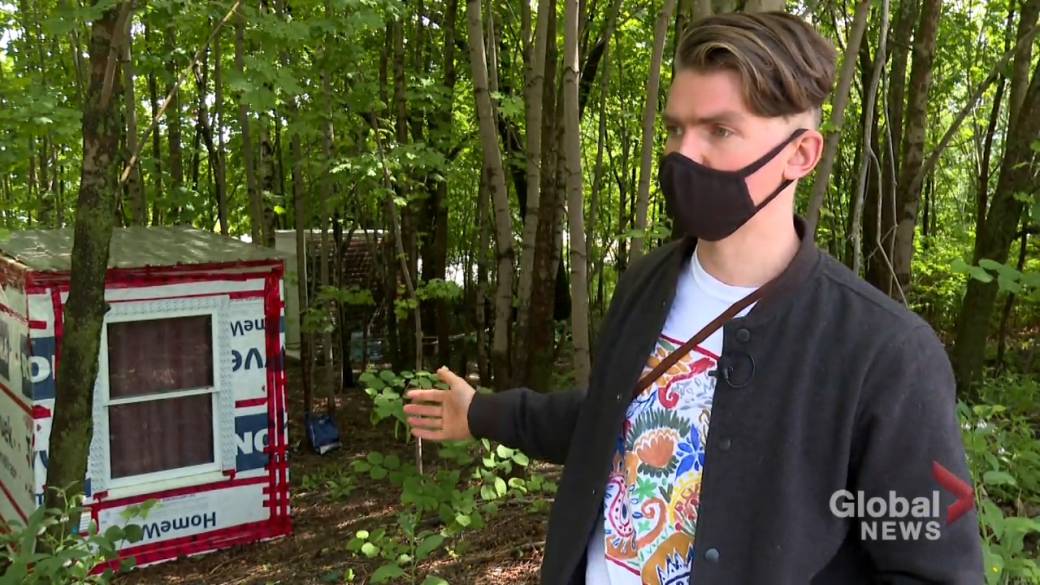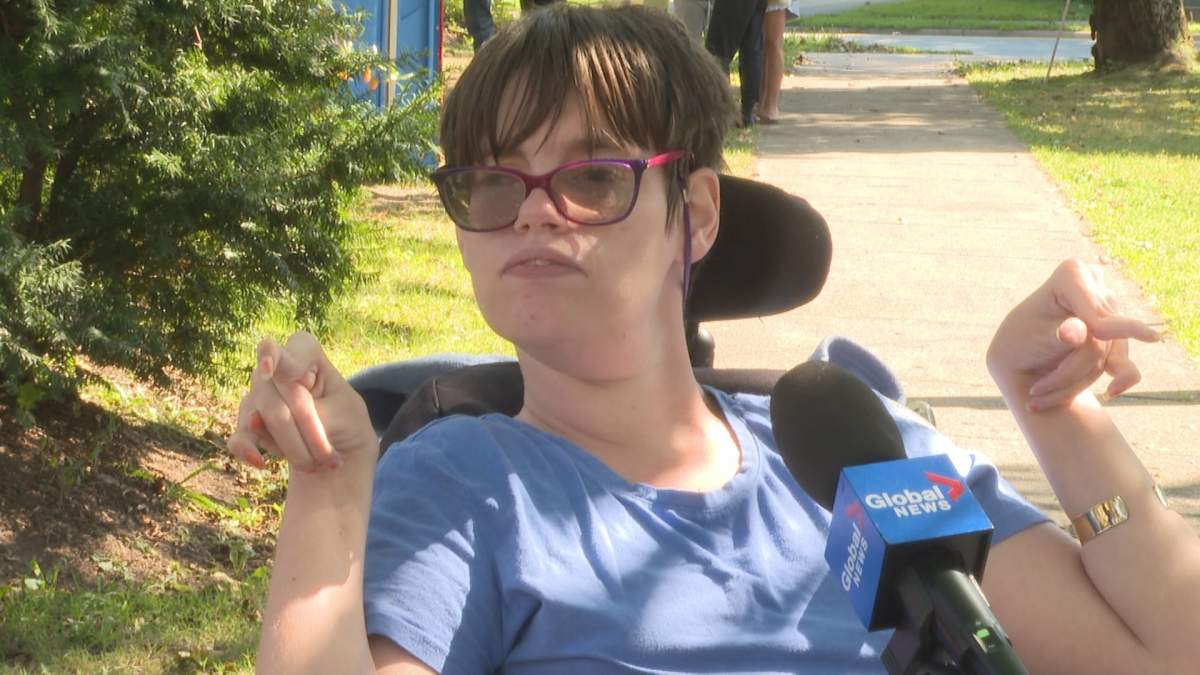This is the third part of a three-day web series on homelessness in Nova Scotia.

It’s been more than 100 days since dozens of Halifax Regional Police officers descended on parks around the municipality to remove unhoused people staying in crisis shelters, but the event remains on the minds of many as the housing crisis persists.
On Aug. 18, hundreds of people poured into downtown Halifax to call attention to the police-led evictions of unhoused people who had been living in parks because they had nowhere else to go.
The day culminated with officers deploying pepper spray into crowds of people and arresting 24 of the protesters.
The event has drawn condemnation from advocates, homeless service providers, and some members of the general public. A rally earlier this week called on governments and police to issue a public apology over the evictions and for the charges against protestors to be dropped.
But the evictions also led to a shift in the way the community at large looks at homelessness — and at the systems which punish those who are experiencing it.
“For those who were not willing to see that harsh reality, they can’t ignore it anymore,” said Campbell McClintock, the spokesperson for Halifax Mutual Aid.
Halifax Mutual Aid is a group of volunteers who build small wooden shelters for unhoused people to sleep in around HRM. Their shelters were the ones that were torn down in August.
McClintock is not involved in building the shelters — “Nary have I swung a hammer or used weatherproof tape,” he said — but he acts as a public face for the group, whose organizers are anonymous due to fears of retaliation from the city.
The organization started in the winter of 2020. “It was becoming clear to a number of community individuals that there is a growing population of people who are being systemically deprived of housing,” McClintock said.
Such deprivation, he added, is “something that is dangerous year-round, but particularly dangerous in the winter.”

In the days following the shelter evictions, officials from the city insisted that everyone who was displaced was offered alternative housing, but council later admitted that was not, in fact, the case.

Get breaking National news
Councillors also repeatedly said their hands were tied because housing is a provincial responsibility — a claim McClintock took issue with.
“It does not get us anywhere to continue passing the buck. The city and the province both have responsibilities they can fulfill,” he said.
McClintock pointed to the fact that, after days of public pressure following the evictions, the city ended up approving $500,000 to create emergency housing for unhoused people.
“So we know that there is more that they can do. … They would just rather not do it because it’s not convenient and it’s not immediately financially rewarding for them to do so,” he said.
“And the result of this is that they end up playing a game with the lives of people who have nowhere to go.”
- Bombardier warns of ‘significant impact’ to travellers from Trump’s threat
- Stepfather of two missing N.S. kids charged with sexual assault of adult, forcible confinement
- Trump threatens Canada with 50% tariff on aircraft sold to U.S.
- Canadians have billions in uncashed cheques, rebates. Are you one of them?
Since the encampment evictions and the widespread public criticism that came from them, there has been some movement from both the city and the province to address the housing crisis.
The city is building modular units in Dartmouth and Halifax, with wraparound services provided by Out of the Cold.
The units in Dartmouth, which will house 24 people, are expected to be finished by Dec. 20 and the units in Halifax, which will house 44, are expected to be completed by late January 2022.
And in a surprise move, after months of saying it would not support rent control, the provincial Progressive Conservative government announced in October that it would keep a two per cent rent cap in place until the end of 2023.

McClintock said he doesn’t believe those changes would have happened if it wasn’t for the mounting public pressure and work from organizations and advocates in bringing this issue to the forefront.
“It’s really important that all of us as a community come together to continue talking about this issue and holding governments’ feet to the fire until something is done, because they are not going to do it on their own,” he said.
“They will only make concessions if they are humiliated or embarrassed into doing so.”
There are currently more than 400 people struggling with homelessness in the Halifax region, according to the latest numbers from the Affordable Housing Association of Nova Scotia. More than a quarter of those experiencing homelessness are Indigenous or Black.
Homelessness data is sparse outside of the city, but there are dozens to hundreds of others who are unhoused outside of Halifax.
Urgency needed
Vicky Levack is the spokesperson for P.A.D.S Community Network, which advocates for permanent, accessible, dignified and safe housing.
The organization started after the encampment evictions in August. A group of volunteers set up camp at Meagher Park — also known as People’s Park — where unhoused people can stay, and P.A.D.S helps provide of food and personal items.
Levack said she’s heartened by the community effort to protect unhoused people.
“I am so proud of our community for coming together and saying, ‘This is bull crap, what can I do to help?’” she said, though she added that it’s disappointing this work is falling on members of the public.
“The fact that we have to do it is so sad, and I have never felt more ashamed of our government.”
Around 20 people were staying at People’s Park at the end of November, but Levack said the numbers are fluid.
She said the province’s housing crisis needs to be treated with much more urgency, especially with winter around the corner.
“As far as I’m concerned, we should be treating this just as urgently as we’re treating the COVID crisis,” she said.
Jeff Karabanow, a professor of social work at Dalhousie University, said he believes the government “misread their tactics for responding to the encampments.”
“I think that they were extremely surprised to see the community’s reaction, not only in disavowing, a bit, the techniques of the state, but in getting to the ground, creating allyship, continuing to argue for more caring and more meaningful responses that continued from that day forward,” he said.
‘We need to get angrier’
Karabanow also noted that the government may be paying more attention to the housing crisis because it’s no longer just impacting those who are most marginalized.
“We’re seeing lower and middle-income families and communities also hit very, very dearly with the housing crisis,” he said.
“I think all those elements as well started to make a larger claim that this was not something that was simply impacting those living in shelters and those on the streets.”
He said people and organizations need to hold governments to account to ensure they continue to work toward a solution.
“We need to continually argue that in order to create safe environments and healthy environments, everybody has to be afforded those opportunities to have safe housing,” he said.
Levack agreed that the fight must continue.
“I think we need to get angrier,” she said.
“If the pandemic has taught me anything, it’s that when there is a crisis, there’s always money available, and this is a humanitarian crisis.
“So, I don’t care what you’ve got to do. Just get these people housed.”










Comments